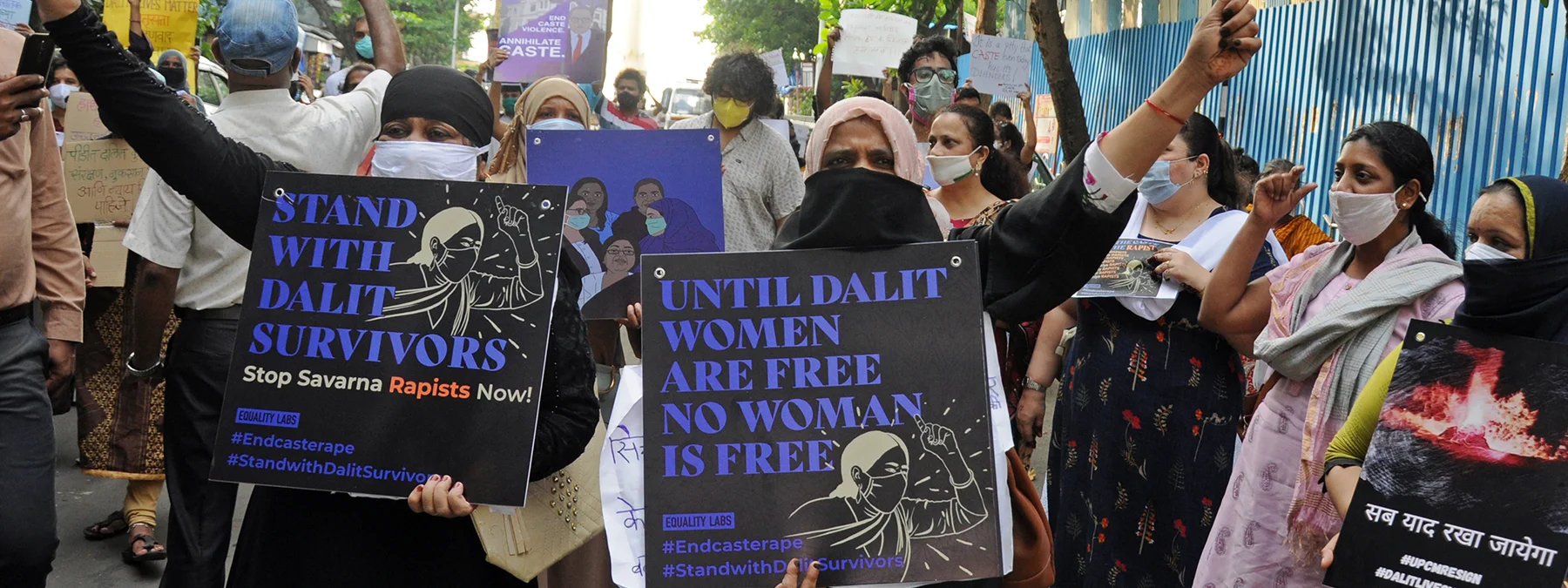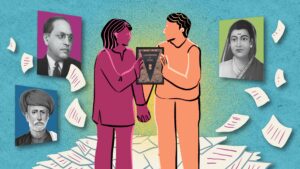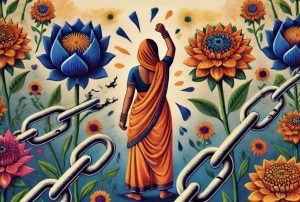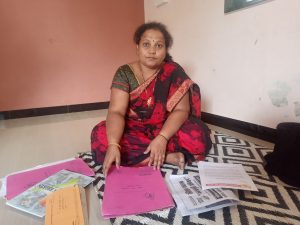Why UP’s Crime Records Fail To Report Full Extent Of Crimes Against Dalit Women
- Eisha Hussain

[This article contains descriptions of sexual and physical violence, which might trigger unwelcome and distressing memories or thoughts. We advise readers to use their discretion before reading.]
Crimes against women in India have dropped by 8.3% and in Uttar Pradesh they have declined by 17.4%, as per the latest Crime in India (2020) data released by the National Crime Records Bureau in September 2021. Crimes against Dalits generally recorded a 9.4% increase — from 45,961 cases in 2019 to 50,291 cases in 2020. UP recorded a 7.4% increase, the second highest after Madhya Pradesh (30%).
As for crimes against Dalit women, here are some significant numbers reported from UP:
- While rape figures for Dalit women dropped by an average of 6.2% across India, in UP they rose by 3.4% between 2019 and 2020. If we go further back to 2017, the spike in the state is of 13.6%
- The number of assaults on Dalit women rose by an average of 3% in India but fell by 24.4% in UP between 2019 and 2020
Does the data reflect the state’s reality? No, say Dalit activisits and lawyers. Marginalised social groups are cornered into underreporting gender crimes, and the pandemic-led restrictions worsened this scenario, they said. Even those who do report crimes are faced with police inaction, administrative negligence, and the social muscle of upper-caste perpetrators. The police and justice system still do not deliver justice to Dalit women, they argued.
It is the Dalit women who are bearing the brunt of the rise in sexual violence in the state, said Seema Gautam, a Dalit activist from Gorakhpur. “The atrocities against Dalits, especially Dalit women, have increased manifold and are in the extreme since 2017. The kind of caste-based violence we are seeing now in the state is unprecedented,” she said. “Dalit women are at the lowest rung of the socio-economic ladder. They bear the double burden of patriarchy – within and outside the community – as well as that of the caste system. They are sexually exploited because the perpetrators know they can be oppressed and silenced.”
As we detail later, the charge sheeting rate in Dalit rape cases has shown a decline in India, indicating how apathetic the police system is towards crimes against oppressed communities.
‘High margin of underreporting’
In the ongoing BJP campaign, leaders have been dwelling at length on the improved state of law and order in UP and its positive impact on women’s safety. This is despite the fact that the highest number of complaints about crimes against women were received from UP in 2021, as per the National Commission for Women. Both the Chief Minister and the Prime Minister have claimed at election rallies that women’s safety in the state has improved ever since BJP was elected to power. The party’s ad campaigns too echo this story.
But there is enough anecdotal evidence that cases of sexual violence, especially against Dalits, have increased since the Yogi-led BJP government has assumed power. In October 2021, a Dalit woman was gang-raped at gun point in a village in Jewar in Gautam Buddha Nagar district of poll-bound Uttar Pradesh. On February 3, 2022, the dead body of a 17-year-old Dalit girl was recovered in Gonda district.
As we said earlier, UP recorded a 3.4% rise in Dalit rapes though national figures had dropped for these cases. This rise was the third-highest in India and followed Telangana (27.7%) and Maharashtra (17.7%).
Activist Seema Gautam argued that the reported numbers are a fraction of the actual acts of sexual violence against Dalit women. Of 10 incidents one is likely to be reported, she said. “That is how underreported the numbers are. When an FIR is not even registered, how will it reflect in the crime numbers? How will people get to know the real scale of violence against Dalit women?” she asked.
This is despite the fact that the police are legally bound to register complaints of sexual assault. According to section 154 of the Code of Criminal Procedure (CrPC), an officer-in-charge of the police station is legally mandated to register every information relating to the commission of a cognisable offence, whether given orally or in writing. In 2013, the Supreme Court of India ruled that if the information given to the police by a complainant or informant discloses the commission of a cognisable offence, it is mandatory for the police to register an FIR.
Despite these guarantees, survivors of sexual violence, especially Dalit women, have to struggle for months to get an FIR registered, as Behanbox reported in an article on how the justice systems fails rape victims in UP.
“The reasons for this are manifold, including the need to maintain the false image of a good law and order situation and shield upper-caste perpetrators. It is not unknown for the perpetrators to often belong to power-wielding upper caste families or have political and social clout which they use to threaten and prevent Dalit victims and their families from taking legal action,” said Manjula Pradeep, a lawyer and a Dalit rights activist.
Long delays
Meera Bharti, a lawyer and a Zila Parishad member of Saria ward in the southern UP district of Chitrakoot, told Behanbox that Dalit complainants are humiliated every step of the way. “When a Dalit woman goes to report an incident of sexual violence, the police either blame her for using the law to extort money or start questioning her character. She is further subjected to an inappropriate and derogatory line of questioning. We think rape happens just once, but a Dalit woman is [emotionally] tortured in every police station and every court room she visits to seek justice,” said Bharti.
In 2019-2020, 14 survivors of sexual violence across seven districts of UP were interviewed about their experience of seeking justice. None of them had been able to get an FIR registered in the first attempt. The study by Centre for Human Rights Initiative (CHRI) and Association for Advocacy Legal Initiative (AALI), titled Barriers in Accessing Justice, pointed out that every survivor of sexual violence in UP faces several barriers in accessing justice.
Survivors face “delay, derision, pressure, and severe harassment when they approach the police to report complaints and seek the registration of an FIR” and they have to wait anywhere between 2 to 228 days to finally get the crime registered, said the report. These barriers are compounded by caste in the case of Dalit women.
“Delay by the police in registering an FIR and initiating the process of investigation, often unaccounted for during the trial, not only has implications on the evidence but also creates windows of opportunity for the alleged perpetrator to threaten and harass and sometimes, even repeat the sexual violence,” stated the CHRI report.
In November 2020, the dead body of a missing Dalit girl was discovered 70 meters away from her house under a haystack in a field in Kalwari area of Basti in eastern Uttar Pradesh. Two police personnel were suspended for not registering an FIR when they received a complaint from the family.
Poor investigation, caste factor discounted
Between 2017 and 2020, the charge sheeting rate in rape cases for Dalit women dropped from 89.8% to 85% and in assault cases from 84.7% to 81.5%, as per the NCRB data. Only 7% of the 38,182 trials in Dalit rape cases and 8.4% of the 37,845 trials in Dalit assault cases have been completed between 2017 and 2020.
As the figures show, even when FIR is registered, it does not always result in state action and the delivery of justice. For instance, a young Dalit woman was abducted from her home in Belha village in Balrampur on January 28, 2021. An FIR was registered after her parents apprised the police of their suspicion that a boy from the dominant Thakur caste was involved because he had been harassing her and had even threatened to kill her. On February 1, the girl’s body had been found just 500 metres from home. The family members had alleged that despite the FIR the police had not investigated the case.
In many cases where FIRs are lodged, appropriate sections under the Scheduled Castes and the Scheduled Tribes (Prevention of Atrocities, POA) Act, 1989 are deliberately not invoked by the police to weaken the case of the survivor and protect the perpetrators, alleged lawyer-activist Pradeep. The POA Act does not have a provision for anticipatory bail for the accused.
“Not invoking POA is a systemic attempt to discount the influence of caste in sexual violence against Dalit women. Even in cases where convictions have been secured, it is often observed that perpetrators are declared not guilty under POA act (see here and here). As a result the quantum of punishment pronounced in the judgement is also not commensurate with that under the act,” said Pradeep.
The unchecked sexual violence against Dalit women is fuelled by a sense of impunity among perpetrators, she said. “In UP, the sense of impunity runs through the entire system starting from CM Yogi Adityanath, who is known to misuse his power to harass minorities in the state, to the police, who work for the perpetrators,” she alleged.
Upper caste repression
In September 2020, the body of a 19-year-old Dalit gang rape and murder victim was burnt in the middle of the night by state authorities in Hathras, and without the consent of her parents. Despite the victim’s claim of being raped by four upper-caste men in her dying declaration, the police maintained that no rape had taken place. However, it was only in December 2020 after the Central Bureau of Investigation’s chargesheet that the accused were charged under sections 302 (murder), 376 (rape), 376A, and 376 (D) of the Indian Penal Code and under section 3(2)(v) of the POA act.
The burning of the body, said Dalit activists and civil society organisations, was an attempt at destroying evidence. In a report submitted by various Dalit organisations to the United Nations Special Rapporteur for Violence Against Women, the following was noted about the Hathras case:
“This case is a clear evidence of biasness and apathy of the police while dealing with the Dalit women cases motivated with caste hatred. The police manipulated the vital evidence in favor of the perpetrators belonging to the upper caste.”
In October, 2020, a public interest litigation was filed in the Supreme Court against government officials involved in the destruction of evidence in this case. The PIL sought an order for the registration of offences against all those involved.
At least four cases of rape victims’ bodies being forcefully burnt by state authorities have been documented by The Print in this article. In two out of the four reported cases, the women belonged to the Dalit community residing in Balrampur and Baranbanki districts of UP.
Long before the Hathras case, the body of a young Dalit girls had been burnt in the Muzaffarnagar district of western UP, claimed local activist Rani who prefers to go by her first name. It is routine for the police to tamper with the evidence crucial to investigations if it helps upper-caste perpetrators, she alleged. “In one of the rape cases of a Dalit girl, who died thereafter, we discovered that her clothes, handed over by the villagers and her family, to the police were washed before they were examined. And once the final post-mortem reports came out, it was concluded that the girl was not raped. Later, the police hurriedly cremated her despite protests from the family and the community,” she said.
Dalit groups say the social and justice system are both prejudiced. “The rapists are upper-caste, the police officials who file our complaints and carry out investigations are upper caste, and those who fight our cases and pronounce judgement are also upper caste. How can we expect justice?” said Gautam.
We believe everyone deserves equal access to accurate news. Support from our readers enables us to keep our journalism open and free for everyone, all over the world.




